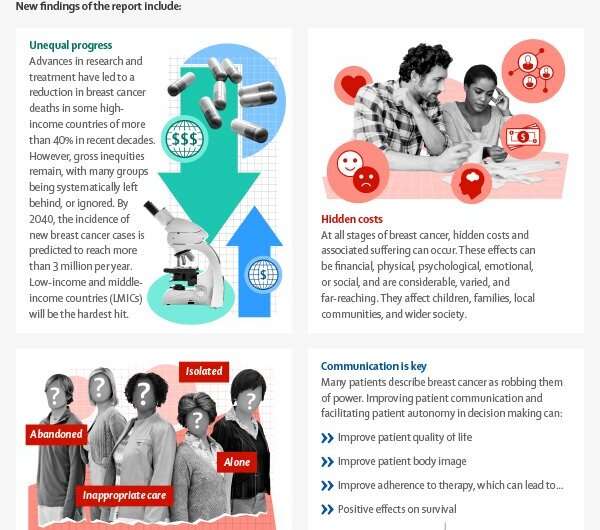
Many people with breast cancer ‘systematically left behind’ due to inaction on inequities and hidden suffering

Breast cancer is now the world’s most common cancer; at the end of 2020, 7.8 million women were alive after having been diagnosed in the previous five years. In the same year, 685,000 women died from the disease. Despite significant improvements in research, treatment, and survival, gross inequities persist, and many patients are being systematically left behind. This is a global blunder, says a new Lancet Commission.
An example of unequal progress in breast cancer relates to patients with metastatic breast cancer (MBC). The number of people living with MBC is unknown and many feel abandoned. Recording relapse in cancer registries to identify those with MBC and shifting negative societal attitudes towards MBC could facilitate optimal support for this patient population.
Hidden breast cancer costs and suffering can be financial, physical, psychological, emotional, and social, with impacts on patients, families, and wider society. Many of the costs associated with breast cancer are not adequately measured and remain overlooked by policymakers and society. New tools and metrics are required to expose these costs so that the needs of people affected by the disease can be met worldwide.
Women with breast cancer often report a sense of disempowerment after diagnosis. The Commission suggests better patient-health professional communication is a crucial intervention that can improve quality of life, body image, and adherence to therapy—with positive impacts on survival.
At the end of 2020, 7.8 million women were alive after having received a breast cancer diagnosis in the past five years; this reflects progress in research and cancer management that has led to a decrease of over 40% in breast cancer mortality in most high-income countries (HICs). However, 685,000 women died from the disease in 2020, and glaring inequities and suffering related to physical symptoms, emotional despair, and financial burden are often hidden and inadequately addressed. A new Lancet Commission sets out recommendations to tackle these urgent challenges in breast cancer.
Estimates suggest that global breast cancer incidence will rise from 2.3 million new cases in 2020 to over 3 million by 2040, and one million deaths from the disease per year are projected by 2040. Low- and middle-income countries are disproportionately affected.
Although breast cancer is the most common cancer, gaps in knowledge continue to prevent effective action. For example, the number of people living with metastatic breast cancer is not known, hampering the provision of treatment and care. At the same time, the scale of breast cancer-related suffering and other costs are not well-measured. “Society and policymakers currently see only the tip of an iceberg,” say Commission authors.
The Commission’s lead author, Professor Charlotte Coles, Department of Oncology, University of Cambridge, UK, a National Institute for Health and Care Research (NIHR) Research Professor and Oncology Consultant at Cambridge University Hospitals NHS Foundation Trust, says, “Recent improvements in breast cancer survival represent a great success of modern medicine. However, we can’t ignore how many patients are being systematically left behind.
“Our Commission builds on previous evidence, presents new data, and integrates patient voices to shed light on a large unseen burden. We hope that, by highlighting these inequities and hidden costs and suffering in breast cancer, they can be better recognized and addressed by health care professionals and policymakers in partnership with patients and the public around the world.”
The number of people with MBC breast cancer is unknown
Even though 20–30% of patients with early breast cancer experience relapse, relapse is not typically recorded by most national cancer registries. Therefore, the number of patients living with MBC is not known. Meeting the needs of an under-measured patient population is difficult, and feelings of abandonment and isolation are common among those living with MBC as a result.
The Commission highlights how, in the last decade, MBC outcomes have improved considerably.
The median overall survival for two MBC subtypes (HER2-positive and ER-positive/HER2-negative), which include approximately 85% of MBC patients, has reached five years where recommended therapies are made available. Some patients may now live 10 years or longer with metastatic disease. In a Commission survey of 382 health care professionals (70% of whom were oncologists; more than half with a clinical focus on breast cancer), 55% agreed that specific subtypes of MBC may become curable, and 75% agreed that MBC will become a chronic disease.
“MBC remains poorly understood by the public, policymakers, and even health care professionals,” says Lesley Stephen, collaborator and patient advocate. She continues, “Some patients have told me that they feel ‘written off.'”
“This sense of being ignored and left behind can mean they are less likely to seek help or engage with research that could help them. A diagnosis of MBC should not stop a person’s contribution to society, but patients with metastatic disease need more support and information in order to feel valued.”
Authors make a case for a minimum of 70% of registries worldwide to record cancer stage and relapse. These data could drive significant improvements in MBC care, outcomes, and emotional well-being among patients. Initiatives that promote societal inclusion of people living with MBC are also paramount; for example, changes to labor market laws that empower more flexible working arrangements. With a shift in perception, it may be possible to treat most, alleviate suffering for all, and forget no one living with MBC, the Commission argues.
Exposing the wide-ranging yet hidden costs of breast cancer
The associated costs of breast cancer—including physical, psychological, social, and financial costs—are immense but under-recognized. Indeed, many of these costs are not captured by current global health metrics.
In response, the Commission established the CASCARA UK-based pilot study, which provides a snapshot of the economic burden and supportive care needs for people affected by breast cancer.
Nearly all of the 606 people living with breast cancer and caregivers surveyed by the Commission stated physical or well-being issues related to breast cancer. “I lost my job when I started chemotherapy as I could not cope very well,” one participant said. “It took me a long time to ask for help with sexual dysfunction,” said another.
Additionally, 20% of participants with early breast cancer and 25% of those with MBC reported difficulty in covering the costs of travel for treatment. 27% with early breast cancer and 35% with MBC said they had financial problems. This pilot research suggests that, even in countries with a health care system free at the point of care, people with breast cancer can incur hidden costs.
Building on previous work, the Commission report also discusses serious health-related suffering (SHS), an indicator of the need for palliative care. Estimates of SHS in breast cancer were provided by a small expert group.
Based on the reported 685,000 global breast cancer deaths in 2020, an estimated 120 million days were spent with serious health-related suffering per year for people who died of their cancer. A further 520 million days were estimated for patients living with the disease. Behind these numbers are individuals experiencing pain, shortness of breath, fatigue, and other, often resolvable, distressing symptoms.
“The impact of breast cancer is wide-reaching, and the studies included in our report hint at the enormity of related suffering and negative experiences at all disease stages. Even in countries with well-developed health care systems, patients with breast cancer experience inadequate support and care.
“In countries lacking affordable health care facilities, patients experience these costs more commonly and intensely, too often leading to catastrophic spending and impoverishment. Global data are essential to expose and better understand and address the multiplicity of needs of all people affected by breast cancer and significantly reduce the global burden of preventable suffering,” says Dr. Carlos Barrios, Oncology Research Center, Hospital São Lucas, Brazil.
The Commission advocates the development of new tools and metrics that capture the many costs associated with the disease. This measurement should guide policymakers to invest in breast cancer prevention, early detection, cost-effective therapy, optimal management, financial protection, and other interventions that relieve suffering.
Better communication for better patient outcomes
Breast cancer is a disease that many patients describe as robbing them of power. Therefore, health care professional-patient communication that empowers is highlighted by the authors as an important intervention. A review of research by the Commission suggests better communication with patients can improve quality of life, decision-making, body image, and even adherence to therapy—with positive impacts on survival.
“Women’s fundamental human rights have historically been accorded lesser respect than men’s in all settings, with implications for patient agency and autonomy,” says Professor Reshma Jagsi, Emory University School of Medicine, U.S.
She continues, “Every health care professional should receive some form of communication skills training. Improving the quality of communication between patients and health professionals, though seemingly simple, could have profound positive impacts that extend far beyond the specific setting of breast cancer management. Patients should be encouraged to exercise their voices, choosing their level of involvement in care decisions.”
The Commission calls for 100% of health care professionals in 100% of countries to receive communication skills training and for patient involvement in all stages of clinical research on breast cancer—from concept to translation into clinical practice. To support these transitions, the report outlines a framework based on strategies to build rapport and empathy, share information, check understanding, and jointly agree next steps with patients.
Collaborate to improve prevention and early detection
Up to one-quarter of breast cancer in HICs could be prevented by modifying risk factors for breast cancer. While education and awareness-raising efforts are important in this respect, bold policy changes that minimize population exposure to modifiable risk factors (including alcohol consumption, being overweight, and physical inactivity) are vital to reduce cancer incidence, suggests the Commission.
In addition, systematic approaches that identify those at increased risk of the disease are essential to enable equitable access to personalized prevention strategies, including cheap and effective medications that can avert breast cancer for many women.
The authors also argue for improved early detection programs, beginning with efforts to promote stage shifting in diagnosis so that at least 60% of confirmed invasive cancers are early disease (stages one or two).
“In all countries, women with low incomes from minoritized backgrounds often have breast cancer diagnosed at a late stage, with a higher risk of dying. Our research lays out numerous other inequities in breast cancer that are at risk of widening further, and that can be addressed through global collaboration. Access to evidence-based prevention and care that isn’t dependent on where an individual lives or their ability to pay would reap wide-ranging benefits for patients, families, and health care systems striving to achieve universal health coverage.
“We urge decision-makers to implement our recommendations and accelerate progress on closing the breast cancer equity gap,” says Professor Benjamin Anderson, Departments of Surgery and Global Health, University of Washington, U.S., who as medical officer at the World Health Organization from 2021 to 2023 oversaw the development and launch of WHO’s Global Breast Cancer Initiative (GBCI).
More information:
The Lancet Breast Cancer Commission, The Lancet (2024). DOI: 10.1016/S0140-6736(24)00747-5
Citation:
Many people with breast cancer ‘systematically left behind’ due to inaction on inequities and hidden suffering (2024, April 15)
retrieved 16 April 2024
from https://medicalxpress.com/news/2024-04-people-breast-cancer-systematically-left.html
This document is subject to copyright. Apart from any fair dealing for the purpose of private study or research, no
part may be reproduced without the written permission. The content is provided for information purposes only.
Segue as Notícias da Comunidade PortalEnf e fica atualizado.(clica aqui)






